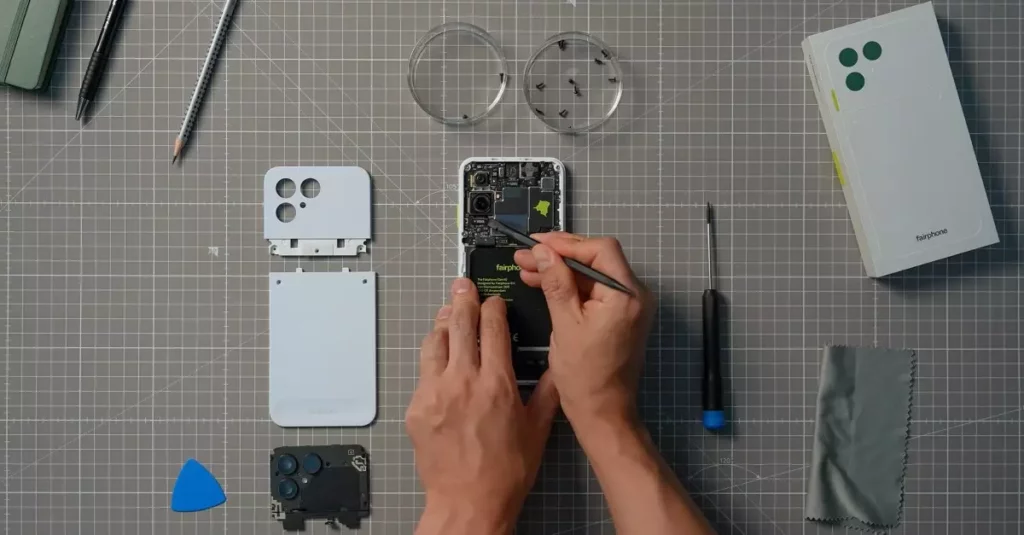In an era dominated by disposable electronics, the Fairphone series stands as a bold testament to sustainable and repairable technology. The latest iteration, the Fairphone 6, upholds this legacy by demonstrating that durability and modularity are still attainable, even as the industry shifts toward sleek, ephemeral devices. Unapologetically, Fairphone emphasizes repairability over raw performance, acknowledging that modern consumers should prioritize longevity and environmental responsibility rather than chasing fleeting flagship specs. The fact that the Fairphone 6 has earned perfect scores in iFixit’s teardown assessments—yet continues to be modest in power—strikes a provocative chord within this landscape.
This philosophy runs counter to the prevailing trend where repairability is sacrificed in favor of slim designs, glued components, and sealed enclosures. Fairphone’s unwavering commitment to user-serviceable hardware smashes the myth that high repairability must come at the expense of design finesse. Their minimal tool requirements—just a single T5 Torx screwdriver—highlight a pragmatic approach that empowers users rather than alienates them. The inclusion of swappable accessories and replaceable backplates exemplifies a broader ideological stance: consumers should be owners, not mere renters of their devices.
Challenges and Trade-offs: Quality vs. Convenience
Despite its impressive repair record, the Fairphone 6 isn’t without compromises. Its specifications—average camera sensors, a less-than-powerful Snapdragon 7S Gen 3 chipset, and a USB 2.0 port—are evidence that sustainability and repairability still force trade-offs in the modern smartphone market. This reflects a reality that many consumers overlook when chasing the latest flagship; the allure of top-tier specs often undermines the very purpose of durable design. A fair critique is that prioritizing serviceability sometimes results in hardware that lags behind the technological curve, possibly alienating power users seeking cutting-edge features.
Yet, the decision to compromise is a rational one if viewed through a pragmatic lens. Fairphone’s design philosophy recognizes the environmental and economic costs of constantly upgrading devices, preferring instead to extend the device’s lifecycle through modularity and support. Long-term software support—seven years of OS updates and eight years of security patches—further underlines their devout stance on sustainability. The notion of a smartphone as a long-term investment rather than a fleeting luxury challenges the consumer culture that encourages frequent replacements. Such an approach appeals to center-right perspectives rooted in responsible stewardship and economic practicality, advocating for smarter consumption rather than overconsumption.
Market Impact and Philosophical Underpinnings
The fair valuation of the Fairphone 6—marking it as an expensive yet inherently ethical choice—raises fundamental questions about market dynamics. Is this model sustainable enough to reshape consumer expectations? While it commands a premium price, especially stateside where it ships with de-Googled, privacy-focused alternatives, it still faces an uphill battle in a landscape obsessed with exploitation of planned obsolescence.
The relentless focus on repairability and long-term support exposes the flawed logic of the current smartphone industry, which routinely relies on six-month upgrade cycles and non-serviceable designs to stimulate sales. Fairphone’s success in maintaining perfect teardown scores across multiple generations underscores the non-negotiable viability of repairability as a core value. Far from just an eco-conscious niche, this approach hints at a future where devices are seen as assets to be maintained, not waste to be discarded.
While the industry often dismisses repairability as an inconvenience or cost-inflator, Fairphone’s prolonged commitment suggests a recalibration—one that could propel the market toward more responsible manufacturing standards. By aligning their brand with environmental stewardship and user empowerment, they challenge the dominant narrative that innovation equates solely with speed and power, elevating repairability to a badge of honor. This ideological stance doesn’t just appeal to eco-enthusiasts; it urges a reconsideration of what consumers truly deserve from their devices.
With each release, Fairphone confronts the unsustainable practices of the mainstream tech industry head-on. Their unwavering pursuit of repairability and longevity not only questions the profit-driven, throwaway culture but also offers a compelling alternative rooted in responsibility and pragmatism. While their hardware may never match the flash of flagship phones, their model pushes the industry toward a more mature, considered approach—one that centers on durability and user empowerment, aligning comfortably with a center-right liberal ethos that champions responsible innovation and sustainability.









Leave a Reply